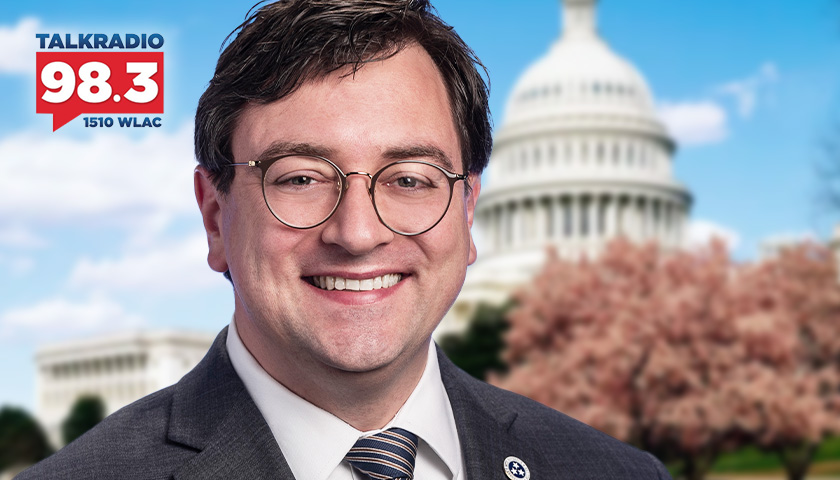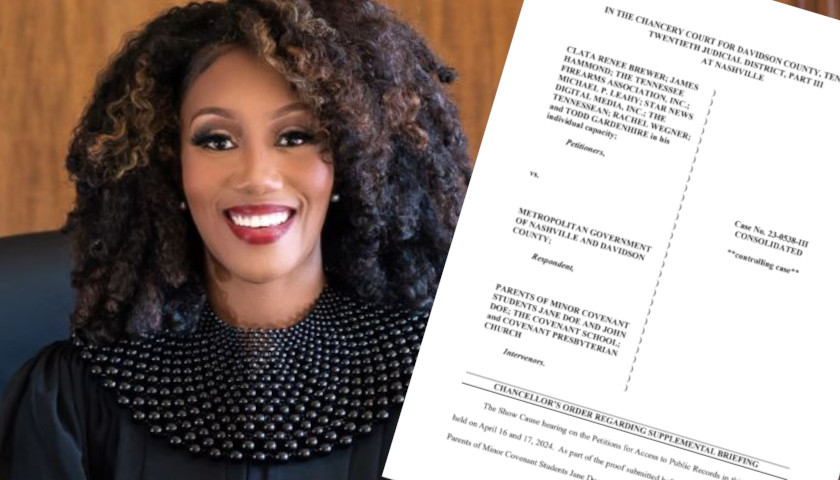Live from Music Row, Monday morning on The Tennessee Star Report with Michael Patrick Leahy – broadcast on Nashville’s Talk Radio 98.3 and 1510 WLAC weekdays from 5:00 a.m. to 8:00 a.m. – host Leahy welcomed recently appointed Tennessee Attorney General Jonathan Skrmetti in-studio to explain Title IX, the unelected administrative state, and the job’s biggest surprise.
Leahy: We have in-studio, not just our all-star panelist, Crom Carmichael, and not just Braden Boucek from the Southeastern Legal Foundation, but the new Attorney General of the state of Tennessee, Jonathan Skrmetti. How did Jonathan Skrmetti come to Tennessee? Who brought him?
Boucek: I like to take a little bit of credit for it, frankly. I was in Memphis working at the United States Attorney’s Office, and Jonathan worked at the Civil Rights Division for the main justice of the Department of Justice. And not surprisingly, he found his way to Memphis a great deal of time to investigate various civil rights complaints.
So we became friends, and right away, he was a great culture fit for Tennessee, and everyone recognized his innate talent. So we were pleased to get him here. I’ve been in the fight to restore constitutional balance in Tennessee for a long time. I’ve been affiliated with some of Tennessee’s premier conservative groups, and I know that many average Tennesseeans have not felt well served in court.
They’ve not felt like their interests have been served in court except from the public interest world. And so I think the Tennesseans as embodied by the Title IX comments, can be delighted to see that there’s pushback for conservative principles and restoring constitutional balance. And whether it comes from somebody with dot-org or a dot-gov address, it’s just a big win for Tennessee.
Leahy: Great. And you also have mentioned that Attorney General Skrmetti has been a leader on the Title IX fight. Tell us a little bit, General Skrmetti, about the current status of that.
Skrmetti: Sure. So Tennessee had responded to the earlier iteration of this.
Leahy: And let me just add, explain what Title IX is.
Skrmetti: Title IX was passed in 1972. It’s civil rights legislation dealing with education, both primary education and higher education saying you can’t discriminate. And the relevant piece of it today is the prohibition on discrimination on the basis of sex. And there are some parts of the law that explicitly authorize discrimination.
So, for instance, you’re allowed to have a girl’s dorm and a boy’s dorm. You’re allowed to have separated bathrooms under this law. But otherwise, you’re not supposed to discriminate on the basis of sex. And there’s been a recent move to expand this, and it’s universal throughout the federal government. There was an executive order almost at the start of the Biden administration.
It was one of the first things he did, instructing all of the agencies to expand the definition of sex in all the different federal regulations. And so this law that was intended to prevent sex discrimination, there’s an effort to use that to cover transgender issues and to make it require things that the people who passed it through our legislative process just never contemplated.
And that’s the real problem here. You’ve got an administrative agency trying to remake the law through regulation rather than through legislation. And that’s not how our system works. That’s not how our system is supposed to work. And that’s not sustainable. We can’t have a functional democracy if the administrative state is making all of the big policy decisions for us.
Leahy: That’s a very important point. We can’t have a functional democracy if the administrative state – the unelected administrative state – is making all the decisions for us. From a political point of view, I think that leads to a sense of helplessness, or anger, among average citizens.
Skrmetti: It does. It does. Over time – and we’ve seen this already – over time, there’s atrophy in the muscles that we have as a society to make our own decisions and to govern ourselves. And you saw this with Dobbs, too, right?
Leahy: And tell our listeners what Dobbs is.
Skrmetti: Sure. Dobbs was the big case this summer that overturned Roe v. Wade. And it was characterized as an assault on our democracy, as undermining our democracy, when the only thing the Supreme Court said was, that this is a decision that should be made through the democratic processes of the states and not through the courts.
And people are so accommodated, or so accustomed to this technocratic, elite-run system, that they don’t recognize when they’re given the ability to make their own decisions; when they are given the opportunity to persuade others as to the correctness of their point of view, they see that as dangerous.
And it is the fundamental process by which our laws are made. We are a representative democracy, and if we can’t perform as a representative democracy, we’re in trouble.
Leahy: Last question. General Skrmetti, you’ve been on the job since September 1st. That’s the 19th day on the job. So far, what’s been the biggest surprise in the job for you?
Skrmetti: Oh, gosh, (Chuckles) there’ve been a lot. Really, it’s just the volume of stuff that comes through. I oversaw a big part of the office when I was the chief deputy attorney general. I hadn’t appreciated just how much else there was. I had about 160 of our 180 lawyers under me, but there are all sorts of other things involving administrative processes.
And so there’s a huge management piece to this. And I was well prepared by my predecessor for that. General Slatery took management very seriously. But it is a big part of the job. And so there are a lot of plates to keep spinning.
Leahy: And the other thing that I find so fascinating is the role that the attorney general plays in guiding policy, because members of the general assembly can ask you for an opinion on legal issues. Is the volume of those opinion requests growing as well?
Skrmetti: It appears to be holding steady. We’ll give some formal advice through opinions. I think the biggest area of growth is informal, and they can just come and ask us for legal advice, and we’ll give it to them.
Leahy: Attorney General Jonathan Skrmetti, thanks so much for being our guest, please come back again in-studio.
Skrmetti: Absolutely, thank you.
Listen to today’s show highlights, including this interview:
– – –
Tune in weekdays from 5:00 – 8:00 a.m. to The Tennessee Star Report with Michael Patrick Leahy on Talk Radio 98.3 FM WLAC 1510. Listen online at iHeart Radio.








